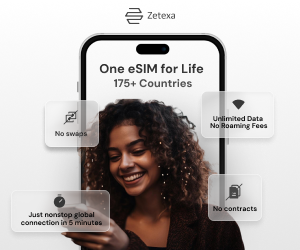
Hayo Launches White-Label eSIM Platform to Help Mobile Operators Go eSIM-First
Hayo, a global digital solutions company, has unveiled a full-stack eSIM platform designed to help mobile network operators (MNOs) transition from traditional SIM infrastructure to a modern, eSIM-first model. The platform, which can be fully white-labelled, gives operators everything they need to launch, manage, and monetize eSIM services—without building their own complex systems from scratch.
At its core, Hayo’s solution is about restoring control. Instead of outsourcing eSIM onboarding or revenue streams to third-party aggregators, operators can now own the entire digital journey — from activation to analytics — under their own brand.
“eSIMs are changing the game not only for travellers, but also in sectors such as IoT where speed, scale, and flexibility are key,” said Feraz Ahmed, CEO of Hayo. “For too long, MNOs have been constrained by the limitations of physical SIM cards. With our eSIM platform, we’re giving them the ability to deliver instant, secure, and borderless connectivity, putting them back in control of the customer experience.”
What’s Inside Hayo’s eSIM Platform
The company’s end-to-end architecture includes every component required for a complete eSIM ecosystem:
- eSIM Profile Generation Engine
- SM-DP+ Hosting & Delivery
- App & Web Distribution Channels
- Remote & In-App eSIM Provisioning
- Custom APN Services
- Global Roaming Agreements
- Aggregator CMP Platform
- White-Label Branding
- Analytics & Reporting Tools
With TLS 1.2+ encryption and full GSMA compliance (SGP.01–32), Hayo’s system supports secure, one-time QR activations, mandatory KYC/eKYC validation, and complete audit logging for activations, downloads, and revocations—ensuring both security and regulatory adherence.
Operators can also use Hayo’s Aggregator CMP platform to manage roaming partnerships and prioritize preferred networks, helping them recover revenue lost to third-party data steering.
Global Expansion and Industry Impact
“Hayo is helping operators enter the eSIM market with confidence,” said Boaz Yaya, Director of Operator Relations at Hayo. “By combining over 30 years of telecom experience with a network of more than 500 partners, we’re accelerating eSIM adoption across Africa, the Middle East, and beyond.”
The timing is strategic. GSMA Intelligence predicts that between 61% and 88% of smartphone connections will use eSIMs by 2030, making it one of the most significant shifts in telecom since 4G. Physical SIMs are becoming a logistical and financial burden — slow onboarding, higher fraud risk, limited scalability — while eSIMs offer instant provisioning, lower churn, and new B2B and IoT monetization paths.
How It Compares: A Growing Race for eSIM Enablement
Hayo enters a field already occupied by strong players like Workz, Thales, Giesecke+Devrient, and 1Global — all of which offer secure eSIM management solutions. However, most of these focus on infrastructure or enterprise-grade deployment. Hayo’s unique angle is its white-label and commercial flexibility, giving even mid-sized regional operators a turnkey way to deploy eSIM without huge capital or regulatory barriers.
That distinction could prove crucial as eSIM adoption accelerates. Smaller and emerging operators—especially in Africa, Latin America, and parts of Asia—face a costly and complex entry into the eSIM market. Hayo’s ready-to-launch model fills that gap.
Alertify Take: Why This Matters
The eSIM revolution is no longer about technology—it’s about control and revenue recovery. As roaming intermediaries and global eSIM resellers increasingly own the customer experience, MNOs risk becoming background providers. Platforms like Hayo’s could reverse that trend, allowing operators to reclaim ownership of digital onboarding and rebuild direct relationships with subscribers.
For context, research from Juniper Research suggests global eSIM installations will surpass 3.5 billion by 2027, with travel and IoT driving the strongest demand. The winners in this space will be those who offer flexibility, security, and simplicity—three pillars that Hayo seems to have prioritized.
In a market where connectivity is becoming a commodity, Hayo’s platform gives MNOs something more valuable: the ability to differentiate on user experience, brand trust, and seamless integration — not just on data prices.











